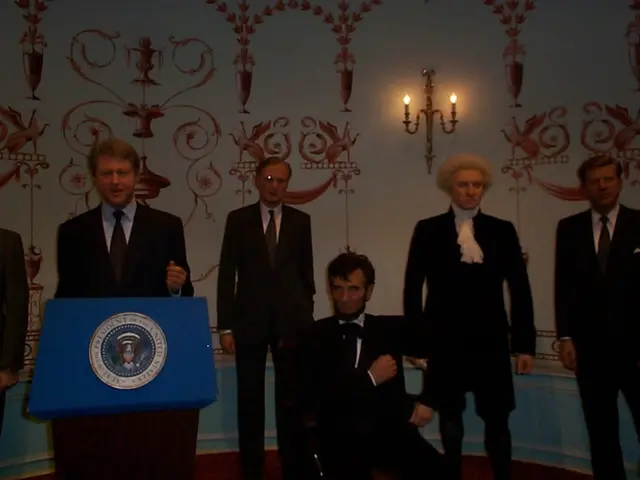Discussion on Ruhs critique: GDR's approach to challenging inquiries
In a move that has sparked controversy and debate, the Northern German Broadcasting (NDR) has decided to part ways with host Julia Ruhs following the airing of the pilot episode "Migration - What's Going Wrong". The decision has been met with criticism from various quarters, including politicians and media personalities, while some have expressed support for the NDR's decision.
Julia Ruhs, a journalist from Baden-Württemberg, is known for her show "Klar", which she has been hosting for the NDR. However, internal criticism and accusations of a lack of journalistic balance and failure to meet public broadcasting standards have led to her dismissal. This decision has been officially framed as quality assurance rather than political censorship.
The dismissal of Ruhs has not sat well with many NDR employees, with almost 250 signing a protest letter to the editorial board. Criticism of the "Klar" format has come from various sources, including ZDF reporter Nicole Diekmann, satirist Jan Böhmermann, and NDR journalist Anja Reschke.
Politicians from various parties have also weighed in on the issue. CDU's Hamburg MP Christoph de Vries has criticised the NDR's handling of the situation as "scandalous", while Jens Spahn, the leader of the Union faction, has described the decision as "very problematic". Schleswig-Holstein's Minister-President Daniel Günther finds the NDR's actions an "extremely bad signal". Even the CSU leader and Bavarian Minister President Markus Söder has criticised the decision, stating it is not a good signal for freedom of speech, pluralism, and tolerance in the public broadcaster.
However, not everyone shares this view. There is support for the NDR's decision from SPD and Green Party circles. NDR program director Frank Beckmann stated that the topics, not a moderator, should be the focus of the format. The NDR values "diversity of perspectives in the program" but did not answer specific questions about the dismissal. The NDR also stated that it fosters an "open discussion culture", but did not comment on the employees' protest letter.
In response to her dismissal, Julia Ruhs and her team have accused the NDR of "cancel culture". CDU General Secretary Carsten Linnemann has demanded consequences and suggested freezing fees to force reforms.
Despite the controversy, the NDR will continue the format in 2026 with more episodes and several moderators. Tanit Koch, former Bild editor-in-chief, will replace Ruhs as the host of "Klar" for NDR-produced episodes starting in 2026, while Ruhs will continue with the BR-produced episodes of the format. The Bavarian Broadcasting Corporation would like to continue working with Ruhs.
The NDR decided not to use Ruhs anymore after three pilot episodes, which also included one about the farmers' protests and one about the consequences of the corona pandemic. The future of "Klar" remains uncertain, but one thing is clear: the decision to part ways with Julia Ruhs has sparked a significant debate about journalistic balance, freedom of speech, and the role of public broadcasters in Germany.
Read also:
- United States tariffs pose a threat to India, necessitating the recruitment of adept negotiators or strategists, similar to those who had influenced Trump's decisions.
- Weekly happenings in the German Federal Parliament (Bundestag)
- Southwest region's most popular posts, accompanied by an inquiry:
- Discussion between Putin and Trump in Alaska could potentially overshadow Ukraine's concerns








